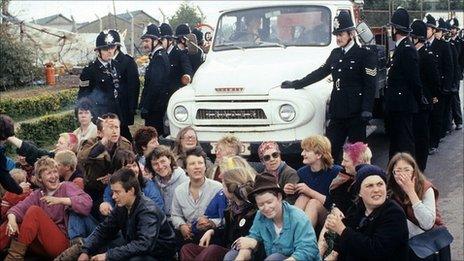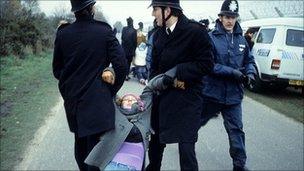'My life at Greenham Common'
- Published

Women campaigned outside RAF Greenham Common for 19 years between 1981 and 2000
"I slept outside through two winters without a tent in the snow."
Juley Howard was 16 and came from a "conservative family".
Attending a girls' grammar school in Rugby, Warwickshire, she was doing well studying for her A-levels - until she went on a day's protest trip to RAF Greenham Common in 1983.
"I felt very strongly that nuclear weapons represented everything that was evil in the world and are a complete degeneration of humanity," said Ms Howard, now 44.
"Beforehand I thought the women were just a load of scruffy dossers and were hijacking a serious campaign.
"But when I went there I felt the energy of that demonstration and saw the physical contrast of the women on one side of the wire and soldiers on the other side of the wire.
"I completely changed my attitude."
Over the next few months Ms Howard became more involved with the camp, which was set up on 5 September 1981 by the Welsh group Women For Life on Earth.
They were against the decision to site 96 cruise nuclear missiles at the US air base.
Over the next few years tens of thousands of women would join the protest, including Ms Howard who transferred her A-level studies to a college in nearby Newbury.
However, Ms Howard found it hard to concentrate on school work, as living at the camp was a "physical struggle".
'Annoying the military'
"We were evicted four or five times a week, bailiffs came and cleared everyone off the land," she said.
"We were doing direct action, breaking into the base, generally annoying the military and trying to disrupt their activity.
"Sometimes the police would arrest you and just dump you miles away and you'd have to walk 10 miles to get back again."
She described the living conditions as poor and physically demanding. Food was cooked on camp-fires and shelter was limited.

Some of the women were arrested as a result of their activities at Greenham Common
Ms Howard said she slept through two winters without a tent.
"You'd wake up in the morning under a piece of plastic and you'd be covered in snow and you'd have to push it away before you get out."
Ms Howard, who said she went to jail nine times, befriended a librarian in Newbury who sent her A-level course notes, helping her to pass her exams.
Other members of the local community also helped out during a time when the protesters were banned from launderettes and other service-providers.
"The Quakers were an absolute godsend," she said.
"They installed a coin meter for hot showers and a washing machine for us in their central meeting house, and we could cook in their kitchen."
Ms Howard passed her A-levels aged 19 and won a place at Bristol University in 1987.
And while she said her criminal record had implications for her in the job market, she now works for a charity helping female victims of domestic abuse.
"I think one thing I've gained from it is the ability to do virtually anything," she said.
"I'm so glad we stood up and said 'no' to something like that."
- Published27 August 2011
- Published23 June 2011